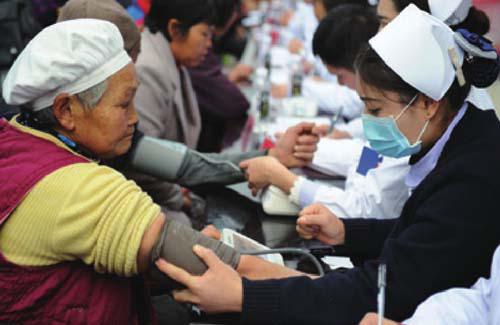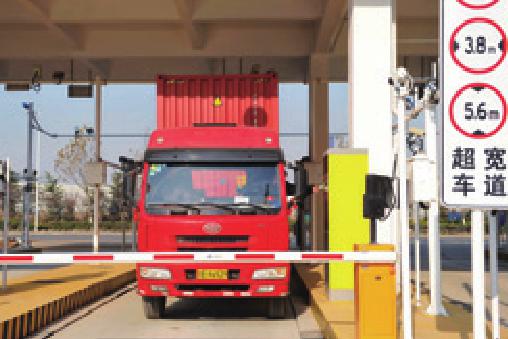Service in Solidarity
2018-01-15

Medical workers provide free health examination and consultation to impoverished villagers in Shiqian County, southwest Chinas Guizhou Province, on December 18.
Book on Reform
The Peoples Publishing House has brought out a new book, What Makes Reform and Opening up Successful? The book, on the reason and experience behind the success of Chinas 40-year reform and opening up, is compiled by the Chinese Academy of Governance.
It describes the course and achievements of the initiative under the leadership of the Communist Party of China, and summarizes the Chinese experience, wisdom and approach obtained in the process.
The book is available at Xinhua Bookstore outlets.
CPC Rule
The General Offi ce of the Communist Party of China (CPC) Central Committee has issued a trial regulation on how leading Party member groups should discuss and decide disciplining Party members.
Discipline inspection groups, sent by the CPC Central Commission for Discipline Inspection and the National Supervisory Commission, have the responsibility of supervision.
A discipline inspection group stationed at a department is responsible for fi ling and investigating cases of discipline violations committed by city-level offi cials of the department, the regulation said.
The discipline inspection group will make a preliminary suggestion for punishment and discuss it with the departments leading Party member group. The case will then be transferred to central discipline inspection and supervision authorities for trial after the two groups reach a consensus.
Cases of discipline violations by county-level offi cials of a department can be investigated and tried by the Party committee and the departmental discipline inspection commission.
The penalty should be discussed and decided by the departments leading Party member group, and advised by the discipline inspection group stationed at the department.
The regulation will go into effect on January 1, 2019.
Preserving History
North Chinas Inner Mongolia Autonomous Region is working to collect and preserve the ancient texts of three ethnic minorities, local authorities said on December 19.
The ethnic affairs commission of the city of Hulun Buir is translating and compiling the historical texts and fi les of the Ewenki, Daur and Oroqen ethnic groups, including many collected from the public, for better conservation.
The commission has collected 1,794 pages of texts dated between 1636 and 1949. Written in the Manchu language, they include government fi les, folk legends, and records of local religious beliefs and practices.
The three ethnic groups do not have their own written languages. Many of their records are in Manchu and Mongolian.
Online Advice
The website of Chinas Central Government, Gov.cn, began to accept public suggestions and opinions on government work from December 20.
Major online news outlets and platforms are collaborating with the website to collect viewpoints on 20 kinds of issues including government service, the business environment, education, medical care and employment.
Constructive advice will be referred to the drafting group of next years central government work report.
This is the fi fth consecutive year that the State Council has launched the advice-pooling activity, known as Share Your Thoughts With Premier Li.
Submissions will be accepted until the next annual sessions of the National Peoples Congress and the National Committee of the Chinese Peoples Political Consultative Conference.
Olympic Store
The International Olympic Committee (IOC) and its partner, the Alibaba Group, launched the fi rst offi cial Olympic online store on Tmall, Chinas largest e-commerce platform, on December 15.
The store offers off ciial products of the Olympic Games Collection, the Olympic Heritage Collection and the Olympic Collection.
The Olympic Games Collection includes branded products for upcoming Olympic Games like the Beijing 2022 Games and Tokyo 2020 Games. The Olympic Heritage Collection features products from previous Olympic Games while the Olympic Collection targets youngsters and will mainly offer sports equipment and toys.
The Alibaba Group became the IOCs partner in January 2017. It serves as the offi cial cloud services and e-commerce platform services partner of the IOC, and is a founding partner of the Olympic Channel through to the 2028 Los Angeles Games.
Celebration Parade
Macao Special Administrative Region held an international parade on December 16 to mark the 19th anniversary of Macaos return to the motherland.
The parade attracted more than 70 groups from the Chinese mainland, Macao and Hong Kong, as well as from foreign countries including Japan, Brazil and Mozambique. It featured folk dances, acrobatics, stilt walking, Chinese martial arts and puppet shows.
Starting from the renowned ruins of St. Pauls, it ended at Sai Van Lake Square. One of the major cultural events in Macao since 2011, the parade was organized by Macaos Cultural Affairs Bureau and the local tourism offi ce.
Plateau Spirits
Tibetan antelopes in the wilderness of the Qiangtang National Nature Reserve, southwest Chinas Tibet Autonomous Region, on December 14. The habitat of the reserves wild animals has seen substantial improvement after environmental protection measures were taken.
AI Tour Bus
A fl eet of sightseeing buses equipped with artifi cial intelligence(AI) technology devices started trial operation in Shanghai on December 19.
Co-developed by Chinese search engine giant Baidu and a Shanghai-based tourism company, the double-deck tour bus aims to make travel more convenient for tourists through AI technology.
Tourists can get on the bus directly through facial recognition. The wireless translators on the bus provide translation services and audio guides and answer questions.
The translator supports multiple languages including English, Japanese, Spanish and Arabic.
The two tour routes cover the most famous and classic travel destinations in Shanghai.
The buses will start offi cial operation from January 2019. A fl eet of 10 tour buses will be initially put into use with another 10 buses later.
Baidu and Shanghai inked a strategic cooperative agreement in November to promote the construction of Shanghai as a smart city.
Safe Buses
A guideline released by the Work Safety Commission of the State Council has asked local authorities to take more measures to ensure safe driving of buses and strengthen guardrails on bridges to prevent accidents.
The guideline was released on December 17 after a bus with 15 people on board plunged off a bridge into the Yangtze River in southwest Chinas Chongqing Municipality in October. The mishap resulted from a quarrel between the driver and a passenger.
The commission has asked government departments and local governments to learn from the accident and take more measures to prevent similar incidents.
More efforts should be made to ensure buses drive safely, including improving shield facilities, deploying security personnel on buses and conducting training for bus drivers to improve their abilities to handle emergencies.
Disaster relief capabilities on the Yangtze should also be improved.
The penalty for those who violate the law must be upped while passengers should be encouraged to report incidents of disturbing bus drivers.
Fight for Future
A student prepares for the national entrance exam for postgraduate studies at a library of University of South China in Hengyang, central Chinas Hunan Province, on December 16.
Simplified Approval
Chinas top economic planner has decided to streamline the rules for getting new Sino-foreign auto joint ventures approved.
The longstanding practice of checking and ratifying the administration of auto joint ventures will be changed into the management mode of fi ling records or registration only, according to a source from the National Development and Reform Commission (NDRC).
The new rules, which will go into effect on January 10, 2019, also apply to the administration of new electric passenger cars and auto investment projects overseen by provincial governments, according to the NDRC source.
In recent years, China has reduced the number of restrictions on foreign investment by nearly two thirds and also signifi cantly reformed the approval system for foreign investment.
Bridging the Gap
The last deck is installed on the Xiangxi River Bridge in Zigui County, central Chinas Hubei Province, on December 16. The Xiangxi is one of the main tributaries of the Yangtze River. The bridge has a main span of 470 meters.
AI Hotel
Chinese Internet giant Alibaba opened a hotel with artifi cial intelligence (AI) and robots on December 18, automating a series of procedures like check-in, lighting control and room service.
FlyZoo Hotel in Hangzhou, capital of east Chinas Zhejiang Province, where Alibaba is headquartered, is known as the companys fi rst “future hotel.”
Customers can check in by simply scanning their faces. The facial recognition system also enables customers to use their faces to open doors and access other hotel services.
Users can also control the light- ing, television and curtains in the room via Alibabas voice-activated digital assistant, while robots are deployed to serve food, cocktails and coffee.
In addition, hotel booking and check-out can be done with a few clicks on a smartphone through an app.
“The AI-based solution can help customers save time and relieve hotel employees from repetitive work,”said Wang Qun, CEO of FlyZoo Hotel.
TCM Tourism
Experts who attended a tourism forum in Beijing said health tourism featuring traditional Chinese medicine (TCM) is embracing a golden opportunity for development.
“Cross-border health tourism is in fashion now,” said Li Jiangbin, an offi cial with the State Administration of Traditional Chinese Medicine, at the International Health Tourism Forum held on December 12.
At the meeting, the World Federation of Chinese Medicine Societies announced the establishment of a special committee to promote TCM health tourism worldwide.
TCM health tourism offers tourists an array of services such as acupuncture and cupping therapy while learning about related theories and traditional culture.
Health tourism is a useful channel for introducing TCM to the world and enabling people in more countries to benefi t from it, Li said.
Senior Care Fund
The Asian Development Bank (ADB) said on December 14 that it has approved a $150-million loan to help develop a comprehensive elderly care system in Yichang in central Chinas Hubei Province.
“The project in Yichang will serve as a model for a comprehensive senior care system in the country and help promote the provision of suitable care for older people with nice facilities and effi cient services,”said ADB senior social sector specialist Hiroko Uchimura-Shiroishi.
The Manila-based bank said China has the largest elderly population in the world and the growing demand for senior care far outpaces existing services.
“Developing a suitable and effi cient long-term elderly care system is a huge challenge many municipalities in the country are facing,” the multilateral lending bank said.
To address these problems, the ADB said the project will improve home-based and community-based care services and facilities, including for those suffering from dementia, build a geriatric hospital and nursing home, and help develop a management scheme to ensure proper services and monitoring.
Economic Resilience
The Political Bureau of the Communist Party of China (CPC) Central Committee studied the economic work for 2019 during a meeting on December 13 in the lead-up to a tone-setting central economic work conference, hinting at the resilience of the Chinese economy.
The meeting was more positive in describing Chinas external environment than three other key Central Committee economic work meetings in 2018, according to a research note by CSC Financial, a Chinese investment bank.
Mention of an “important period of strategic opportunity” and repeated references to focusing on domestic affairs mean economic policies in 2019 will be more about addressing issues at home, the research note said.
Commenting on the strategic opportunity, Haitong Securities senior researcher Jiang Chao said policies would advance the high-quality development of the manufacturing sector, cultivate a stronger domestic market and speed up economic reforms and opening up.
“Despite the increasing downward pressure, signals from the meeting are not pessimistic,” Jiang said. “The country should continue to seize this important period of strategic opportunity for development and seek an optimal policy mix with maximum effects.”
New Growth Drivers
A worker handles textile at a workshop in Luannan County, north Chinas Hebei Province, on December 18. The county has transformed traditional industries by developing new technologies and business models.
Fending off Risks
Chinas insurance sector has shown a stronger capacity to fend off risks as its overall leverage has gradually dropped and its business structure improved, the insurance regulator said.
The China Banking and Insurance Regulatory Commission(CBIRC) said the general and core solvency ratios of 178 insurance companies stood at 245 percent and 234 percent, respectively, at the end of the second quarter of 2018.
Both ratios were well above the safe level, the CBIRC said.
The regulator said the sectors solvency has been suffi cient and stable while noting increasing pressures from external changes.
Property insurance companies saw the highest general solvency ratio at 265 percent, followed by 254 percent for reinsurance companies and 241 percent for life insurance companies.
Solvency represents insurance companies debt-paying abilities. While the general ratio shows the overall condition of their capital, the core ratio is more focused on highquality capital.
Efficient Passage
A truck driver takes a carnet at the Bonded Logistics Center of the Qingdao West-Coast Economic New Area on December 18. Featuring cross-border e-commerce, the center is the fi rst of its kind in east Chinas Shandong Province.
FDI and ODI
Foreign direct investment (FDI) in the Chinese mainland stayed basically stable in the fi rst 11 months of 2018, the Ministry of Commerce(MOFCOM) said on December 14.
A total of 54,703 new overseasfunded companies were established during the period, up 77.5 percent year on year, MOFCOM data showed.
FDI from January to November reached 793.3 billion yuan ($115 billion), down 1.3 percent year on year.
In November alone, the number of new overseas-funded enterprises increased 11.1 percent year on year to 5,158, according to the data.
FDI in November fell 26.3 percent year on year to 92.1 billion yuan ($13.4 billion).
The MOFCOM attributed the monthly decline to a high base of comparison in the same period last year.
Chinas non-fi nancial outbound direct investment (ODI) in the fi rst 11 months of the year remained fl at, data from the MOFCOM showed.
Domestic investors made$104.48 billion non-fi nancial ODI in 5,213 overseas enterprises in 157 countries and regions from January to November, the ministry said in a statement.
ODI in countries along the Belt and Road rose 4.8 percent year on year to $12.96 billion during the same period.
The structure of outbound investment continued to improve, with investment mainly going into leasing and business services, manufacturing, mining, and retail and wholesale sectors.
